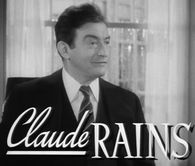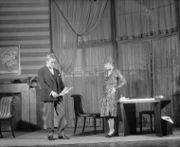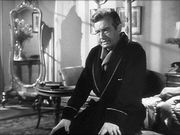Claude Rains
| Claude Rains | |
|---|---|
 Claude Rains in Now, Voyager (1942) |
|
| Born | William Claude Rains 10 November 1889 Camberwell, London, England |
| Died | 30 May 1967 (aged 77) Laconia, New Hampshire, U.S. |
| Occupation | Actor |
| Years active | 1920–1966 |
| Spouse | Isabel Jeans (1913-1915) (divorce) Marie Hemingway (1920-1920) (divorce) Beatriz Thomas (1924-1935) (divorce) Frances Propper (1935-1956) (divorce) Agi Jambor (1959-1960) (divorce) Rosemary Clark Schrode (1960-1964) (her death) |
Claude Rains (10 November 1889 – 30 May 1967) was a English-American stage and film actor whose career spanned 47 years; he later held American citizenship. He was known for many roles in Hollywood films, among them the title role in The Invisible Man (1933), a corrupt senator in Mr. Smith Goes to Washington (1939), and, perhaps his most notable performance, as Captain Renault in Casablanca (1942).
Contents |
Early life
Rains was born William Claude Rains in Camberwell, London. He grew up, according to his daughter, with "a very serious cockney accent and a speech impediment".[1] His father was British stage actor Frederick Rains, and the young Rains made his stage debut at 11 in Nell of Old Drury.[2]
His acting talents were recognised by Sir Herbert Beerbohm Tree, founder of The Royal Academy of Dramatic Art. Tree paid for the elocution lessons Rains needed in order to succeed as an actor. Later, Rains taught at the institution, teaching John Gielgud and Laurence Olivier, among others.
Rains served in the First World War in the London Scottish Regiment,[3] with fellow actors Basil Rathbone, Ronald Colman and Herbert Marshall. Rains was involved in a gas attack that left him nearly blind in one eye for the rest of his life. However, the war did aid his social advancement and, by its end, he had risen from the rank of Private to Captain.
Career

Rains began his career in the London theatre, having a success in the title role of John Drinkwater's play Ulysses S. Grant, the follow-up to the playwright's major hit Abraham Lincoln, and traveled to Broadway in the late 1920s to act in leading roles in such plays as Shaw's The Apple Cart and in the dramatizations of The Constant Nymph, and Pearl S. Buck's novel The Good Earth, as a Chinese farmer.
Rains came relatively late to film acting and his first screen test was a failure, but his distinctive voice won him the title role in James Whale's The Invisible Man (1933) when someone accidentally overheard his screen test being played in the next room.[1] Rains later credited director Michael Curtiz with teaching him the more understated requirements of film acting, or "what not to do in front of a camera".[4]
Following The Invisible Man, Universal Studios tried to typecast him in horror films, but he broke free, starting with the role of Prince John in The Adventures of Robin Hood (1938), then with his Academy Award-nominated performance as the conflicted corrupt senator in Mr. Smith Goes to Washington (1939), and followed with probably his most famous role, the flexible French police Captain Renault in Casablanca (1942). In 1943, Rains played the title character in Universal's full-color remake of Phantom of the Opera. Bette Davis named him her favorite co-star, and they made four films together, including Mr. Skeffington and Now, Voyager. Rains became the first actor to receive a million dollar salary, playing Julius Caesar in Gabriel Pascal's lavish and unsuccessful version of Shaw's Caesar and Cleopatra (1945), made in Britain. In 1946, he played a refugee Nazi agent opposite Cary Grant and Casablanca co-star Ingrid Bergman in Alfred Hitchcock's Notorious. In 1949, he appeared in David Lean's The Passionate Friends.
His only singing and dancing role was in a television musical version of Robert Browning's The Pied Piper of Hamelin, with Van Johnson as the Piper. This 1957 NBC color special, shown as a film rather than a live or videotaped program, was highly successful with the public. Sold into syndication after its first telecast, it was repeated annually by many local TV stations.
Rains remained a popular character actor in the 1950s and 1960s, appearing in many films. Two of his well-known later screen roles were as Dryden, a cynical British diplomat in Lawrence of Arabia (1962) and King Herod in The Greatest Story Ever Told (1965). The latter was his final film role.

Recordings
Rains made several audio recordings, narrating a few Bible stories for children on Capitol Records, and reciting Richard Strauss's setting for narrator and piano accompaniment of Alfred, Lord Tennyson's poem Enoch Arden, with the piano solos played by Glenn Gould. This recording was made by Columbia Masterworks Records.
Personal life
Rains became a naturalized citizen of the United States in 1939. He married six times, the first five of which ended in divorce: Isabel Jeans (1913–1915); Marie Hemingway (1920, for less than a year); Beatrix Thomson (1924 – April 8, 1935); Frances Propper (April 9, 1935–1956); and to classic pianist Agi Jambor (November 4, 1959–1960). He married Rosemary Clark Schrode in 1960, and stayed with her until her death on December 31, 1964. His only child, Jessica Rains, was born to him and Propper on January 24, 1938.
He acquired the 380 acre Stock Grange Farm in West Bradford Township, Pennsylvania just outside West Chester in 1941, and spent much of his time between takes reading up on agricultural techniques. He eventually sold the farm when his marriage to Propper ended in 1956.
Rains died from an abdominal hemorrhage in Laconia, New Hampshire on May 30, 1967 at the age of 77. He is interred in the Red Hill Cemetery, Moultonborough, New Hampshire.
Claude Rains: An Actor's Voice, a biography by David J. Skal and Rains' daughter Jessica Rains, was published in 2008.
Awards and nominations
In 1951, Rains won a Tony Award for Best Performance by a Leading Actor in a Play for Darkness at Noon. He was also nominated four times for the Academy Award for Best Supporting Actor, for Mr. Smith Goes to Washington (1939), Casablanca (1942), Mr. Skeffington (1944), and Notorious (1946).
He has a star on the Hollywood Walk of Fame, at 6400 Hollywood Boulevard.
Filmography
| Year | Title | Role | Director | Other cast members | Notes |
|---|---|---|---|---|---|
| 1920 | Build Thy House | Clarkis | Fred Goodwins | Henry Ainley | |
| 1933 | The Invisible Man | Dr. Jack Griffin/The Invisible Man | James Whale | Gloria Stuart, Henry Travers, Una O'Connor | |
| 1934 | The Clairvoyant | Maximus | Maurice Elvey | Fay Wray | |
| 1934 | Crime Without Passion | Lee Gentry | Ben Hecht, Charles MacArthur | Margo, Whitney Bourne | |
| 1934 | The Man Who Reclaimed His Head | Paul Verin | Edward Ludwig | Lionel Atwill, Joan Bennett | |
| 1935 | The Last Outpost | John Stevenson | Louis Gasnier, Charles Barton | Cary Grant | |
| 1935 | The Mystery of Edwin Drood | John Jasper | Stuart Walker | Douglass Montgomery, Heather Angel, David Manners | |
| 1936 | Hearts Divided | Napoleon Bonaparte | Frank Borzage | Marion Davies, Dick Powell, Charlie Ruggles, Edward Everett Horton | |
| 1936 | Anthony Adverse | Marquis Don Luis | Mervyn LeRoy | Fredric March, Olivia de Havilland, Gale Sondergaard | |
| 1937 | Stolen Holiday | Stefan Orloff | Michael Curtiz | Kay Francis, Ian Hunter | |
| 1937 | The Prince and the Pauper | Earl of Hertford | William Keighley | Errol Flynn, Billy and Bobby Mauch | |
| 1937 | They Won't Forget | Dist. Atty. Andrew J. "Andy" Griffin | Mervyn LeRoy | Gloria Dickson, Lana Turner | |
| 1938 | White Banners | Paul Ward | Edmund Goulding | Fay Bainter, Jackie Cooper, Bonita Granville, Henry O'Neill, Kay Johnson | |
| 1938 | Gold is Where You Find It | Colonel Christopher "Chris" Ferris | Michael Curtiz | George Brent, Olivia de Havilland, Tim Holt | Technicolor |
| 1938 | The Adventures of Robin Hood | Prince John | Michael Curtiz, William Keighley | Errol Flynn, Olivia de Havilland, Basil Rathbone | Technicolor |
| 1938 | Four Daughters | Adam Lemp | Michael Curtiz | Rosemary, Lola, and Priscilla Lane, Gale Page, John Garfield | |
| 1939 | They Made Me a Criminal | Det. Monty Phelan | Busby Berkeley | John Garfield, Gloria Dickson, May Robson | |
| 1939 | Juarez | Emperor Louis Napoleon III | William Dieterle | Paul Muni, Bette Davis, Brian Aherne, John Garfield | |
| 1939 | Sons of Liberty (Two-reel short) |
Haym Salomon | Michael Curtiz | Gale Sondergaard | Technicolor |
| 1939 | Daughters Courageous | Jim Masters | Michael Curtiz | Rosemary, Lola, and Priscilla Lane, Gale Page, John Garfield | |
| 1939 | Mr. Smith Goes to Washington | Sen. Joseph Harrison Paine | Frank Capra | Jean Arthur, James Stewart, Thomas Mitchell | Nomination—Academy Award for Best Supporting Actor |
| 1939 | Four Wives | Adam Lemp | Michael Curtiz | Eddie Albert, Rosemary, Lola, and Priscilla Lane, Gale Page, John Garfield | |
| 1940 | Saturday's Children | Mr. Henry Halevy | Vincent Sherman | John Garfield, Anne Shirley | |
| 1940 | The Sea Hawk | Don José Alvarez de Córdoba | Michael Curtiz | Errol Flynn, Brenda Marshall, Henry Daniell, Flora Robson, Alan Hale | Sepia tone (sequence) |
| 1940 | Lady with Red Hair | David Belasco | Curtis Bernhardt | Miriam Hopkins, Laura Hope Crews | |
| 1941 | Four Mothers | Adam Lemp | William Keighley | Rosemary, Lola, and Priscilla Lane, Gale Page | |
| 1941 | Here Comes Mr. Jordan | Mr. Jordan | Alexander Hall | Robert Montgomery, Evelyn Keyes, Edward Everett Horton | |
| 1941 | The Wolf Man | Sir John Talbot | George Waggner | Lon Chaney, Jr., Evelyn Ankers, Patric Knowles, Ralph Bellamy, Warren William, Bela Lugosi, Maria Ouspenskaya | |
| 1942 | Kings Row | Dr. Alexander Tower | Sam Wood | Ann Sheridan, Robert Cummings, Ronald Reagan, Betty Field, Charles Coburn | |
| 1942 | Moontide | Nutsy | Archie Mayo | Jean Gabin, Ida Lupino, Thomas Mitchell | |
| 1942 | Now, Voyager | Dr. Jaquith | Irving Rapper | Bette Davis, Paul Henreid, Gladys Cooper | |
| 1942 | Casablanca | Capt. Louis Renault | Michael Curtiz | Humphrey Bogart, Ingrid Bergman, Paul Henreid, Conrad Veidt, S.Z. Sakall, Sydney Greenstreet, Peter Lorre, Dooley Wilson | Nomination—Academy Award for Best Supporting Actor |
| 1943 | Forever and a Day | Ambrose Pomfret | Herbert Wilcox (sequence with Rains) |
Anna Neagle, Ray Milland, C. Aubrey Smith | |
| 1943 | Phantom of the Opera | Erique Claudin/The Phantom of the Opera | Arthur Lubin | Nelson Eddy, Susanna Foster | Technicolor |
| 1944 | Passage to Marseille | Captain Freycinet | Michael Curtiz | Humphrey Bogart, Michèle Morgan, Philip Dorn, Sydney Greenstreet, Peter Lorre, Helmut Dantine | |
| 1944 | Mr. Skeffington | Job Skeffington | Vincent Sherman | Bette Davis, Walter Abel, George Coulouris, Richard Waring | Nomination—Academy Award for Best Supporting Actor |
| 1945 | Strange Holiday | John Stevenson | Julien Duvivier | Jean Gabin, Richard Whorf, Allyn Joslyn, Ellen Drew | |
| 1945 | This Love of Ours | Joseph Targel | William Dieterle | Merle Oberon | |
| 1945 | Caesar and Cleopatra | Julius Caesar | Gabriel Pascal | Vivien Leigh, Stewart Granger, Flora Robson | Technicolor |
| 1946 | Notorious | Alex Sebastian | Alfred Hitchcock | Cary Grant, Ingrid Bergman, Louis Calhern | Nomination—Academy Award for Best Supporting Actor |
| 1946 | Angel on My Shoulder | Nick | Archie Mayo | Paul Muni, Anne Baxter | |
| 1946 | Deception | Alexander Hollenius | Irving Rapper | Bette Davis, Paul Henreid | |
| 1947 | The Unsuspected | Victor Grandison | Michael Curtiz | Joan Caulfield, Audrey Totter, Constance Bennett, Hurd Hatfield | |
| 1949 | The Passionate Friends | Howard Justin | David Lean | Ann Todd, Trevor Howard | |
| 1949 | Rope of Sand | Arthur "Fred" Martingale | William Dieterle | Burt Lancaster, Paul Henreid, Peter Lorre | |
| 1949 | Song of Surrender | Elisha Hunt | Mitchell Leisen | Wanda Hendrix, Macdonald Carey | |
| 1950 | The White Tower | Paul DeLambre | Ted Tetzlaff | Glenn Ford, Alida Valli, Oskar Homolka, Cedric Hardwicke, Lloyd Bridges | Technicolor |
| 1950 | Where Danger Lives | Frederick Lannington | John Farrow | Robert Mitchum, Faith Domergue, Maureen O'Sullivan | |
| 1951 | Sealed Cargo | Captain Skalder | Alfred L. Werker | Dana Andrews, Lloyd Bridges | |
| 1953 | The Man Who Watched the Trains Go By | Kees Popinga | Harold French | Märta Torén, Marius Goring | Technicolor |
| 1956 | Lisbon | Aristides Mavros | Ray Milland | Ray Milland, Maureen O'Hara | Trucolor Naturama |
| 1957 | The Pied Piper of Hamelin | The Mayor of Hamelin | Bretaigne Windust | Van Johnson, Lori Nelson | Technicolor |
| 1959 | This Earth Is Mine | Philippe Rambeau | Henry King | Rock Hudson, Jean Simmons, Dorothy McGuire | Technicolor CinemaScope |
| 1960 | The Lost World | Professor George Edward Challenger | Irwin Allen | Michael Rennie, Jill St. John, David Hedison, Fernando Lamas, Richard Haydn | Deluxe color CinemaScope |
| 1961 | Battle of the Worlds | Professor Benson | Antonio Margheriti | Bill Carter | Color |
| 1962 | Lawrence of Arabia | Mr. Dryden | David Lean | Peter O'Toole, Alec Guiness, Jack Hawkins, Omar Sharif, Anthony Quinn, Anthony Quayle, Arthur Kennedy, José Ferrer | Technicolor Super Panavision 70 |
| 1963 | Twilight of Honor | Art Harper | Boris Sagal | Richard Chamberlain, Nick Adams, Joey Heatherton, Linda Evans | |
| 1965 | The Greatest Story Ever Told | Herod the Great | George Stevens | Max von Sydow, plus many cameos | Technicolor Ultra Panavision 70 |
References
- ↑ 1.0 1.1 Harmetz p. 147.
- ↑ "The Sublime Claude Rains". meredy.com. http://www.meredy.com/clauderains/cr-bio.html. Retrieved May 12, 2010.
- ↑ londonscottishregt.org
- ↑ Harmetz p. 190.
Bibliography
- Aljean Harmetz, Round Up the Usual Suspects: The Making of "Casablanca" (New York: Hyperion, 1992)
- David J. Skal and Jessica Rains, Claude Rains: An Actor's Voice (University Press of Kentucky, 2008)
External links
- Claude Rains at the Internet Broadway Database
- Performances listed in Theatre Archive University of Bristol
- Claude Rains at the Internet Movie Database
- Claude Rains at Allmovie
- Claude Rains at the TCM Movie Database
- Claude Rains at the British Film Institute's Screenonline
- Stock Grange Farm
- Claude Rains at Find a Grave
|
||||||||